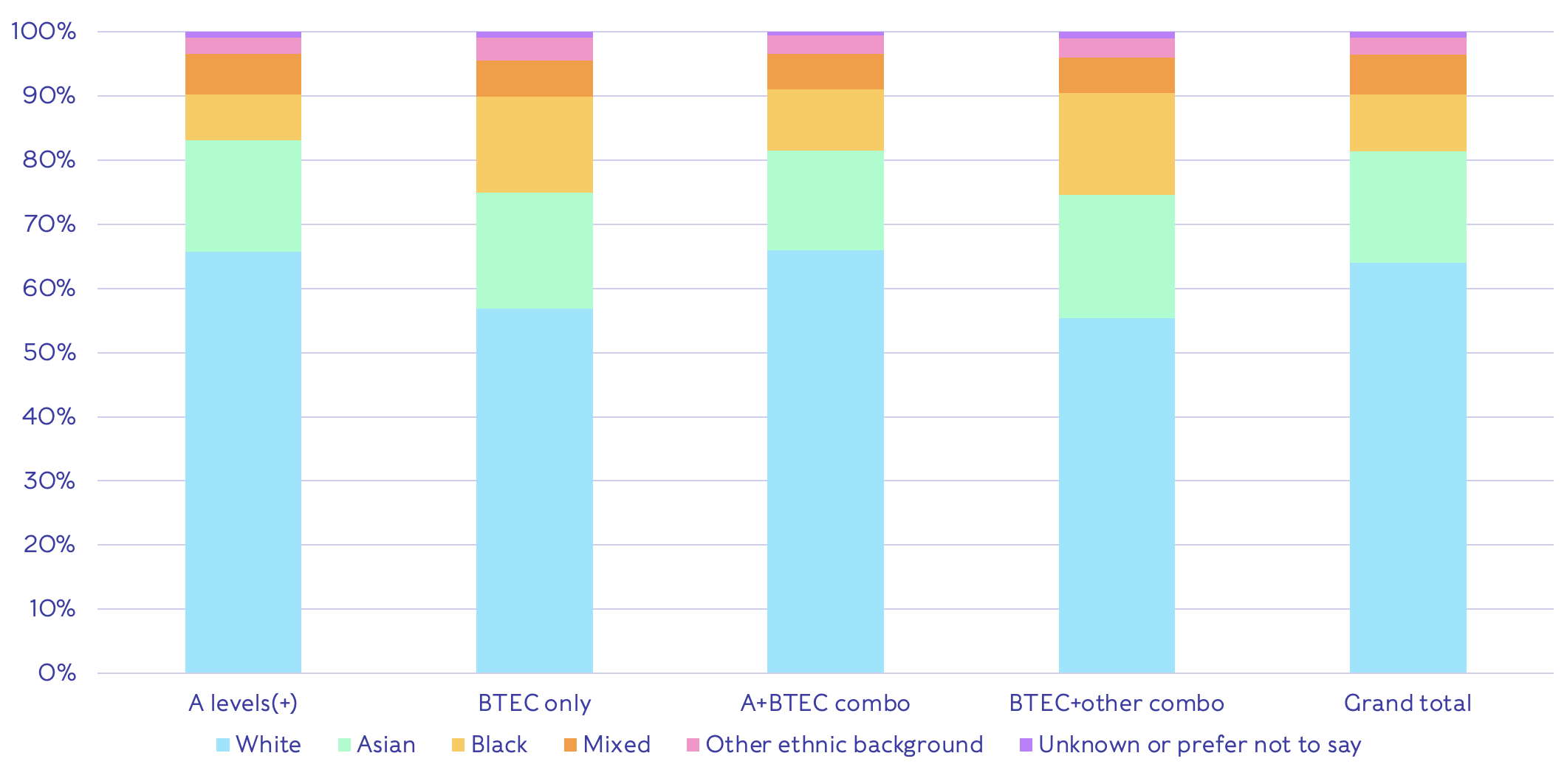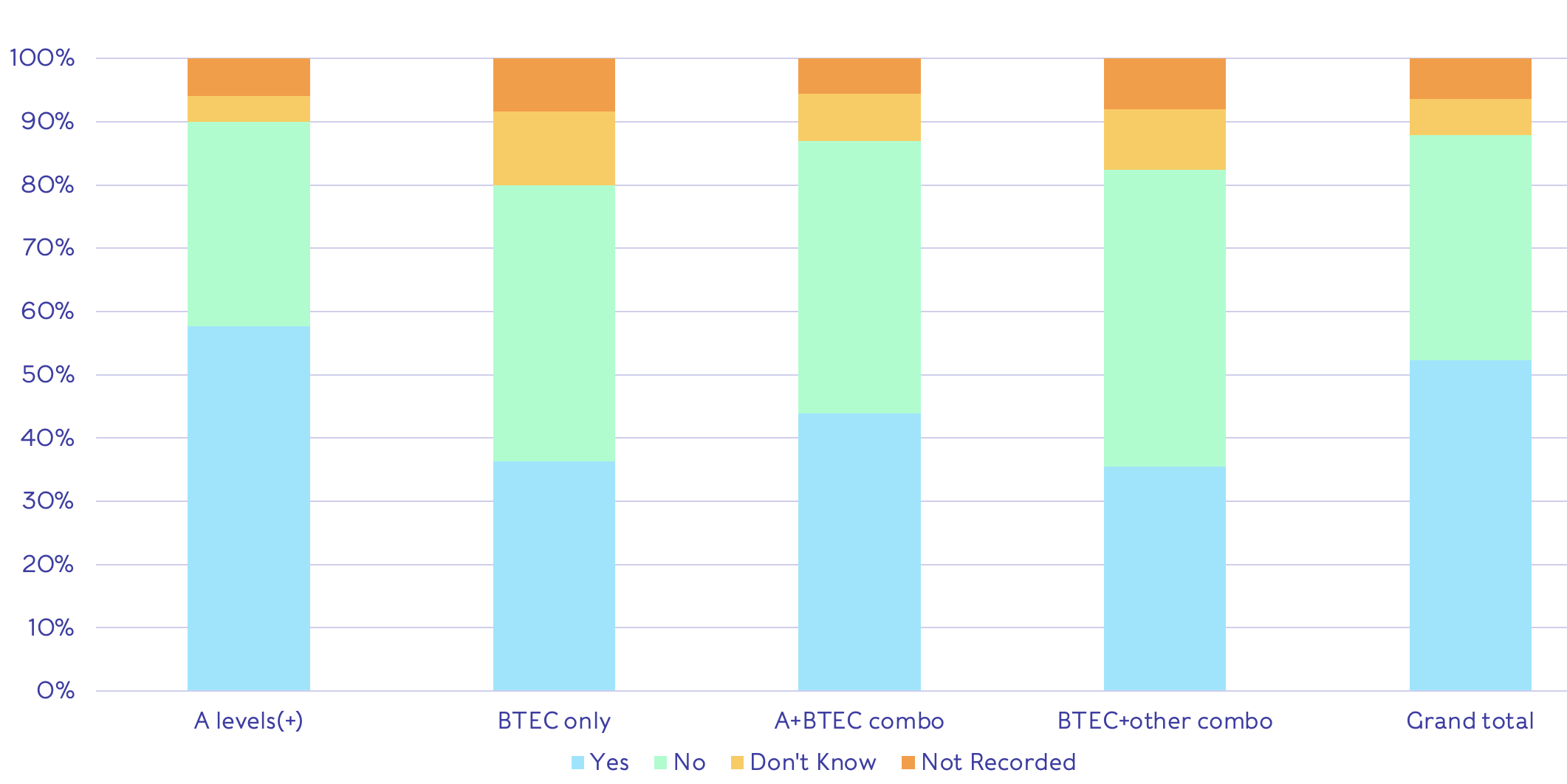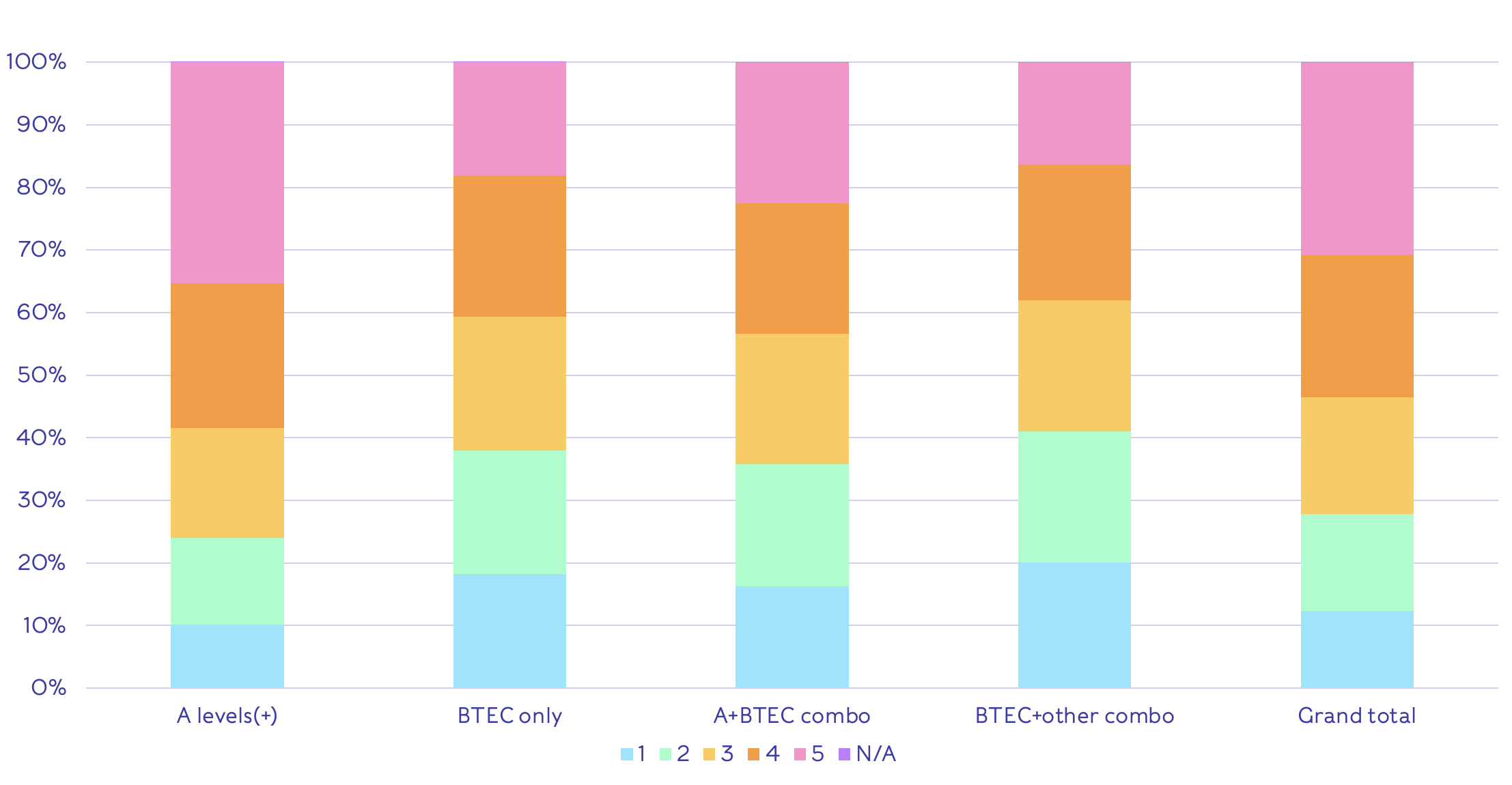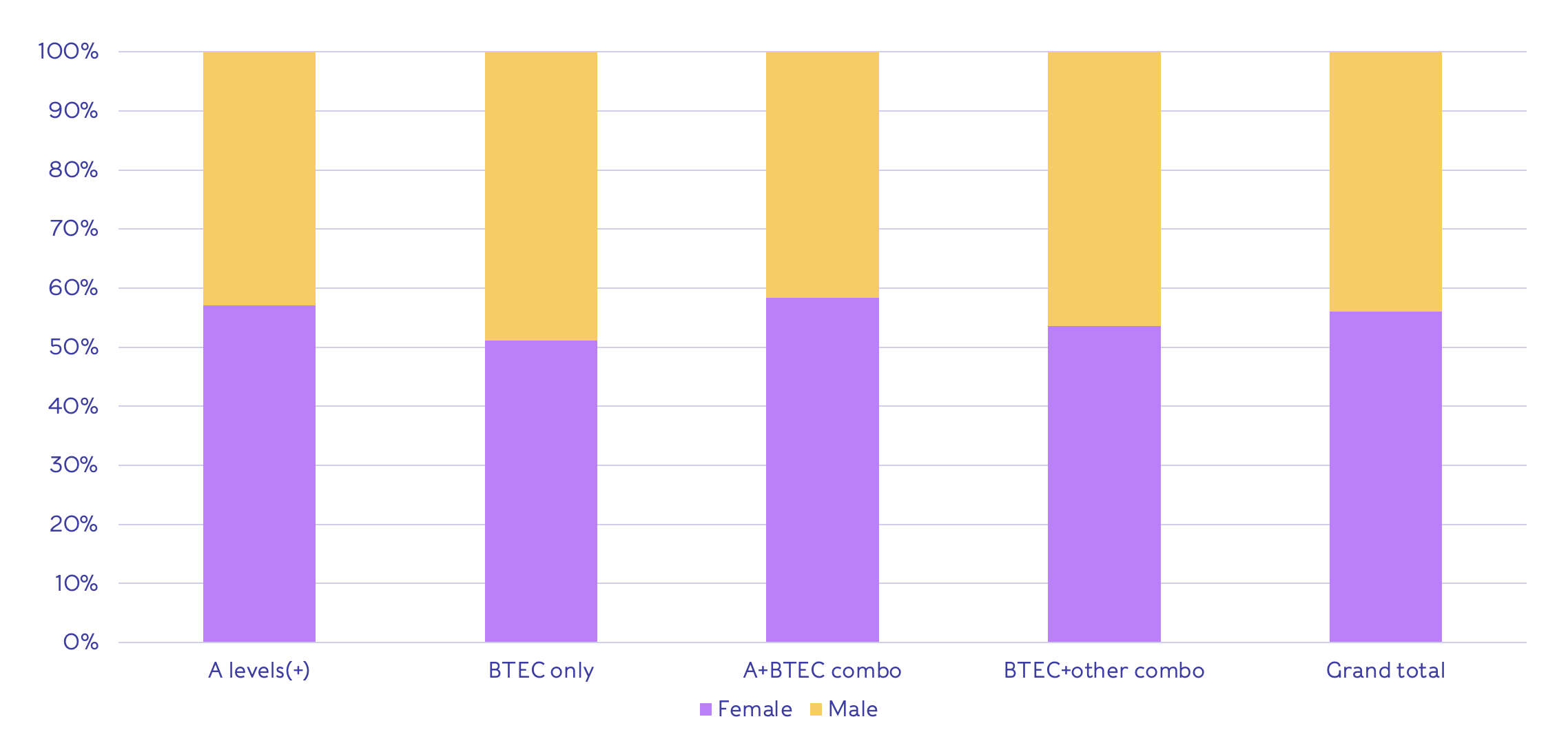There are lots of reasons to rail against the government’s policy to defund BTECs, Cambridge Technicals and other similar applied general qualifications (AGQs). The Sixth Form Colleges Association which leads the Protect Student Choice campaign estimates that this policy is likely to leave over 155,000 students without a suitable level 3 study programme.
This could have a disastrous effect on progression to higher education, higher apprenticeships, level 4 and level 5 programmes and have lifelong consequences for higher levels of unemployment and NEET, lower earnings and worse health and social outcomes for these students. Now that a General Election has been called, it’s even more important to call attention to these issues. If Labour wins the election, it has indicated that it would “pause” the defunding of BTECs, but the analysis below makes it imperative that it moves quickly to do this so that one or more cohorts of BTEC starts is not missed.
Although the current timetable for funding withdrawal runs with the parallel roll out of T levels covering “overlapping” sectors, it is widely predicted that only a small proportion of students who might previously have enrolled on AGQ programmes would transfer to T levels which are seen as more academic and, like A levels, often restricted to those students with relatively high grades in the appropriate GCSEs.
BTECs and other AGQs have always been a strong level 3 choice for students who have been less motivated by the academic curriculum for GCSEs at Key Stage 4. Many of these students flourish on more applied programmes post-16 and go on to successful progression to higher levels of learning, apprenticeships and employment.
Impact on recruitment
For universities, the policy, if enacted, is likely to have a significant impact on domestic undergraduate recruitment from 2026 onwards as shown below.
Placed undergraduate students from English domicile 2022
| Degree subject | Total placed with any qualification | Total placed with a BTEC qualification | Total placed with a BTEC qualification due to be defunded | Proportion of enrolments potentially affected by BTEC defunding |
|---|---|---|---|---|
| business and management | 64,185 | 13,805 | 11,600 | 18% |
| subjects allied to medicine | 55,630 | 13,825 | 10,885 | 20% |
| social sciences | 44,530 | 7,730 | 5,485 | 12% |
| design, and creative and performing arts | 42,170 | 10,060 | 5,765 | 14% |
| biological and sport sciences | 26,125 | 8,805 | 5,730 | 22% |
| computing | 24,510 | 7,130 | 5,605 | 23% |
| psychology | 21,975 | 4,065 | 2,820 | 13% |
| engineering and technology | 21,620 | 4,075 | 3,305 | 15% |
| law | 19,790 | 4,250 | 3,355 | 17% |
| historical, philosophical and religious studies | 13,570 | 740 | 420 | 3% |
| language and area studies | 13,430 | 1,025 | 550 | 4% |
| physical sciences | 11,035 | 1,610 | 1,240 | 11% |
| education and teaching | 11,095 | 2,860 | 1,960 | 18% |
| architecture, building and planning | 9,580 | 1,705 | 1,340 | 14% |
| media, journalism and communications | 8,925 | 2,060 | 1,195 | 13% |
| medicine and dentistry | 8,805 | 235 | 200 | 2% |
| geography, earth and environmental studies | 7,595 | 505 | 265 | 3% |
| mathematical sciences | 6,325 | 215 | 120 | 2% |
| agriculture, food and related studies | 3,645 | 1,045 | 895 | 25% |
| combined and general studies | 1,850 | 185 | 135 | 7% |
| veterinary sciences | 1,670 | 280 | 245 | 15% |
| Total | 418,060 | 86,210 | 63,115 | 15% |
Source: Pearson analysis of UCAS data*
Out of around 86,000 students from England placed in undergraduate higher education with BTECs in 2022, over 63,000 held BTECs that are due to be defunded. As the table above shows, some subject groups such as subjects allied to medicine (including nursing), computing and sport science could lose over 20 per cent of their total recruitment intake, with other big losers including education/teaching (18 per cent), engineering (15 per cent) and business and management (18 per cent). Overall, the planned defunding of these BTECs could lose over 60,000 students or 15 per cent of the undergraduate intake. This would represent an unprecedented fall in recent times.
Typically, about two thirds of BTEC students are school or college leavers (age 17, 18 or 19) who might in the future choose to switch to T level programmes. So even if all the school leaver BTEC cohort switches to T levels (which is highly unlikely), a future recruitment gap of 25,000 students is a predictable minimum. This is equivalent to a more than six percentage point drop in recruitment – also an unprecedented fall.
25,000 fewer undergraduate recruits to higher education would remove around £700 million of tuition fee income from the sector with a large proportion of this falling on medium and lower tariff universities which are more likely to recruit students with applied qualifications. These are the universities which are already under immense financial pressure following flat or falling domestic recruitment in 2023 and reportedly drastic shortfalls – in the region of 40 per cent for many – in international recruitment this January. This is in part because of high recruitment from countries more likely to be affected by the restrictions on dependants’ visas. Further financial pressure comes from unfunded rises in employer contributions to the Teachers’ Pension Scheme (TPS).
The impact on HE participation for under-represented students
Perhaps more worrying is the impact withdrawing BTECs and other AGQs will have on participation in higher education for under-represented groups. The Department for Education’s own impact analysis for its defunding policy concluded that “those from SEND backgrounds, Asian ethnic groups, disadvantaged backgrounds, and males [are] disproportionately likely to be affected.” This conclusion is evidenced in the charts below.
Because many smaller BTECs are not slated for defunding (that is the ones that can be combined with A levels and other qualifications), the “BTEC only” column is the one to note.
The BTEC-only cohort has significantly the highest ethnic diversity.

Placed English domicile undergraduate students 2022, by ethnic background
In the following chart, it can be seen that first-in-family (ie no parental HE) students are much more likely to be holding BTECs.

Placed English domicile undergraduate students 2022, by parental HE
Looking at Polar4 quintiles (quintile 1 being lowest participation neighbourhoods and quintile 5 being highest) in the table below, BTEC students again show the highest proportion of lower quintile progression to HE.

Placed English domicile undergraduate students 2022, by POLAR4 quintile
Just 1.3 per cent or c.4,000 English-domiciled students with a flag for care experience were recruited to HE through UCAS in 2022. A much higher proportion of these students is likely to hold BTECs than non-care experienced students.
 Placed English domicile undergraduate students 2022, by care experience
Placed English domicile undergraduate students 2022, by care experience
With men already significantly under-represented in higher education, the defunding of BTECs and other applied qualifications will worsen the gender gap. The whole population of English undergraduate recruits is around 44:56 male to female. Recruits holding BTECs are 49:51 male to female, as seen in the table below.

Placed English domicile undergraduate students 2022, by sex
The timeline for defunding
BTEC and other similar qualifications are being defunded in waves. BTEC subject areas potentially due to be defunded from 2024 impacting recruitment to HE in 2026 are:
- Children’s Play, Learning and Development (1.5, 2 and 3 A level equivalent)
- Construction (1, 2 and 3 A level equivalent sizes)
BTEC subjects potentially due to be defunded from 2025 impacting recruitment to HE in 2027 are:
- Construction (1.5 A level equivalent size)
- Engineering (AS, 1.5, 2 and 3 A level equivalent sizes for all specialisms)
- Applied Science (AS, 1.5, 2 and 3 A level equivalent sizes)
- Applied Human Biology (AS equivalent size)
- Applied Psychology (AS and A level equivalent sizes)
- Forensic Investigation/Forensic and Criminal Investigation (1.5, 2 and 3 A level equivalent sizes)
- Health & Social Care (AS, 1.5, 2 and 3 A level equivalent sizes)
- IT (AS, 1.5, 2 and 3 A level equivalent sizes)
- Computing (AS, 1.5, 2 and 3 A level equivalent sizes)
- Agriculture (3 A level equivalent sizes)
- Animal Management (1, 1.5, 2 and 3 A level equivalent sizes)
- Blacksmithing and Metalworking (AS, 1, 1.5, 2 and 3 A level equivalent sizes)
- Horticulture (1, 1.5, 2 and 3 A level equivalent sizes)
- Music Technology (1.5 and 2 A level equivalent)
HE planners will want to assess the risk to undergraduate recruitment by looking at data for students holding relevant BTECs or equivalents in the key subjects as well as considering the implications for postgraduate progression for these students. Access and Participation Plans may need to be updated given the disproportionate impact on under-represented groups.
It may be that recruitment shortfalls for HE as a result of this policy are not front of mind for the current government. However, the shadow education team has shown more interest in opportunity and choice in HE for all sections of society and local candidates for election will be interested in the potential impacts for universities in their constituencies. Given the financial stress that is already apparent in the higher education sector, the defunding of BTECs is one policy that an incoming government can reverse swiftly to remove yet one more pressure without committing to any extra funding from the public purse.
* Data used in this article are from bespoke analysis specifications and may therefore differ from publicly available UCAS data. Some data on qualifications held may be self-reported by applicants as well as verified through Awarding Body linkage.













Of the unusual characteristics of English post compulsory education one of the strangest is the multiplicity of qualifications offered by private for profit providers subsidised by the government.
I am not convinced that it is bad policy to remove government subsidies from the multiplicity of post compulsory qualifications offered by private for profit corporations.
Agree – and this article, by the Chair of said profit making organisation, neglects to mention the fact the vast majority of people studying BTECs don’t end up progressing into their chosen fields and the drop out rate in HE is hugely increased compared to other qualifications…
labour need to pledge that they will keep BTECs otherwise so many students will be adversely affected by this they need this choice otherwise we are going to a system whereby only those with the best GCSE’s will be able to move forward with A levels. Also not all educational institutions are able to fill their classrooms with just A level students and some will not be able to offer T levels because of their size. Labour needs to pledge that they will prolong the life of the BTEC’s they will then satisfy many teachers who provide a good education… Read more »
Would like to hear from some universities that have significant BTEC intakes and what it might mean for the students and the provider. Yes BTEC qualified students may withdraw more often but it might be the only way they have a chance at university education and at 18 they are adults who should be given the choice (and yes do we need to present the facts about completion rates to them). Subsidised private vs. public funded educators might be a relevant UK debate but lets first think of the people affected and what is best for them. It is for… Read more »